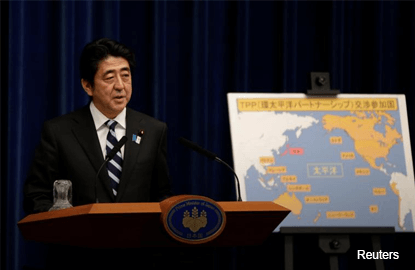
TOKYO (Feb 28): Prime Minister Shinzo Abe said the Bank of Japan's aggressive monetary easing is aimed not just at accelerating inflation but also at spurring growth, in a sign the government was keen to deflect mounting pressure on the BOJ as it struggles to meet its 2% price goal.
Abe said that while the BOJ played a key role in pushing up inflation, it also helped stimulate the economy and create more jobs with its aggressive money printing.
"I hope the BOJ conducts monetary policy to achieve its 2% inflation target, as well as focus on stimulating the economy," Abe told parliament on Tuesday.
The remarks were made amid increasing criticism from opposition lawmakers about the repeated delays in achieving the BOJ's inflation target, and come in the wake of fresh challenges to growth from rising protectionism in the United States.
As economic growth slowed in the fourth quarter, with anaemic inflation, Abe has been under pressure to defend the BOJ's strategy.
Data earlier on Tuesday showed Japan's industrial output unexpectedly fell in January for the first time in six months, pressured by a slowdown in shipments of cars to the United States in a sign of an economy grappling for a more sure-footed recovery.
BOJ Governor Haruhiko Kuroda acknowledged that Japan was still distant from achieving his 2% inflation target, but he said long-term inflation expectations were likely to heighten as economic growth accelerates.
"Long-term interest rates may rise, if the economy improves and pushes up inflation to 2 percent," Kuroda told the same parliament committee.
The central bank chief also conceded that long-term rates could rise as the economy picks up speed, but he emphasised the BOJ's current framework would prevent a destabilising increase in back-end yields.
After three years of aggressive asset purchases failed to accelerate inflation to its target, the BOJ revamped its framework in September last year to one better suited for a long-term battle against deflation. It now targets short- and long-term rates to control Japan's yield curve.
The BOJ blamed an unexpected slump in oil prices, the hit to household spending from a sales tax hike and Japan's sticky deflationary mindset for pushing back the timeline for achieving its price target.